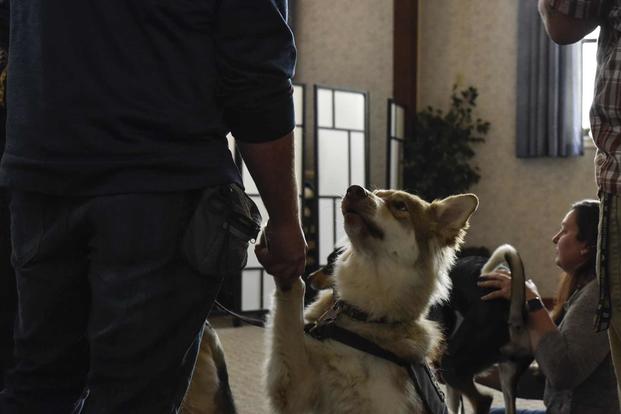A measure reintroduced in the Senate would order the Department of Veterans Affairs to pay for and provide service dogs to veterans suffering from mental health issues, following years of fruitless attempts.
The Puppies Assisting Wounded Servicemembers, or PAWS, Act, introduced by Sen. Deb Fischer, R-Neb., would require the VA to create a grant program to pay for and provide service dogs to veterans with post-traumatic stress disorder and other mental health ailments.
"For veterans suffering from the invisible wounds of war, service dogs have been shown to provide comfort, hope, and companionship," Fischer said in a statement.
Read Next: This GI Bill Rule Change Could Cost Veterans Thousands of Dollars a Semester
The VA covers some costs of service dogs for veterans with certain physical disabilities, such as blindness, but only recently conceded that the animals are beneficial as a mental health treatment.
The PAWS Act has been introduced several times in each chamber over the past few years and has consistently failed to become law. The VA has repeatedly asserted that the science doesn't back up whether service dogs can be beneficial to mental health; the VA committees have taken their cue from the agency.
"We're very confident this is the best year ever to get the PAWS Act through the Senate," Rory Diamond, CEO of K9s for Warriors, said in an interview with Military.com. "In years past, the Senate Veterans Affairs Committee has said we need to wait on the VA's study. Well, now the study is out and it says service dogs work. So, giddy up. Let's go."
The bill would give grants of up to $25,000 per animal to eligible organizations to provide service dogs for veterans. The money covers the average cost of raising, training and pairing a dog with a veteran. K9s for Warriors, a group heavily lobbying for the effort, trains mostly rescue dogs and matches them to veterans suffering from PTSD. So far, the group has paired nearly 700 dogs to veterans.
Nonprofits are one of the only avenues for veterans to adopt service dogs. The VA currently covers only the veterinary costs of service dogs that support veterans with physical disabilities, including blindness and mobility issues.
The department recently wrapped up a study after nearly a decade and found that service dogs do indeed reduce PTSD symptoms. The results also showed that veterans paired with dogs had fewer suicidal behaviors and displayed a decrease in other symptoms, such as anger and disrupted sleep.
The VA also expressed concern about what would happen to a veteran's mental state when their dog eventually develops medical issues and dies. The department noted that veterans aren't automatically strong dog handlers.
From 2005 to 2018, 89,160 veterans died by suicide, according to the most recent data from the VA -- more than the number of Americans killed in each major U.S. conflict except World War II and the Civil War.
There's no evidence the federal government has put a dent into the veteran suicide crisis, with VA's data showing little change in the suicide numbers each year. Between 2005 and 2018, roughly 6,500 veterans died by suicide each year, according to the most recent VA data. Some lawmakers and advocates are urging out-of-the-box thinking when it comes to mental health treatment -- dogs being one idea.
A group of lawmakers introduced the PAWS Act into the House earlier this month.
"Frankly, it's comical except it's not funny that the VA has been studying this issue, thinking about it, pondering over it for a decade," Rep. Michael Waltz, R-Fla., said at a press conference in early March. "Veterans should have a full menu of options and different types of therapies, whether that's service dogs, hyperbaric chambers or other alternative therapy. We have to get out of this paradigm of just providing drugs to vets."
-- Steve Beynon can be reached at Steve.Beynon@military.com. Follow him on Twitter @StevenBeynon.
Related: Lawmakers Push VA to Provide Service Dogs to Vets After a Decade of Failed Efforts













